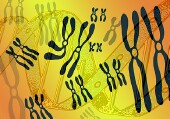Biallelic mutations identified in five children with severe infections, autoimmunity, or both
THURSDAY, June 18, 2015 (HealthDay News) — Biallelic mutations in the dedicator of cytokinesis 2 gene (DOCK2) have been identified in children with early-onset severe infections, autoimmunity, or both, according to a study published in the June 18 issue of the New England Journal of Medicine.
Kerry Dobbs, from the Boston Children’s Hospital, and colleagues performed genetic and cellular immunologic studies involving five unrelated children with early-onset bacterial and viral infections, lymphopenia, and defective T-, B-, and natural killer (NK)-cell responses. Two of these patients died early in childhood; the other three had normalization of T-cell function and clinical improvement after allogeneic hematopoietic stem-cell transplantation.
In these five patients, the researchers identified biallelic mutations in DOCK2. In the T cells, RAC1 activation was impaired. In the T-, B-, and NK-cells, chemokine-induced migration and actin polymerization were defective; NK-cell degranulation was also affected. After viral infection there was decreased production of interferon-α and interferon-λ by peripheral-blood mononuclear cells. Viral replication was increased and virus-induced cell death was enhanced in DOCK2-deficient fibroblasts; treatment with interferon alfa-2b or expression of wild-type DOCK2 normalized these conditions.
“Autosomal recessive DOCK2 deficiency is a new mendelian disorder with pleiotropic defects of hematopoietic and nonhematopoietic immunity,” the authors write. “Children with clinical features of combined immunodeficiencies especially with early-onset, invasive infections, may have this condition.”
The study was partially funded by grants from Union Chimique Belge Celltech and Baxter Healthcare.
Full Text (subscription or payment may be required)
Copyright © 2015 HealthDay. All rights reserved.








